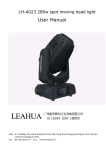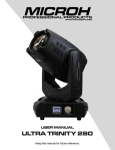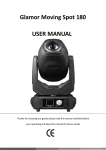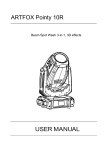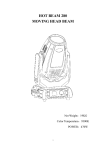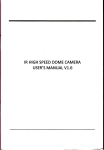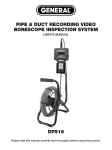Download Viking VK 280 FLX Manual
Transcript
VK280 FLX MOVING HEAD USER MANUAL Rev 2.01 FOR YOUR OWN SAFETY, PLEASE READ THIS USER MANUAL CAREFULLY BEFORE YOU INITALLY START This device has left our premises in absolutely perfect condition. In order to maintain this condition and to ensure a safe operation, it is absolutely necessary for the user to follow the safety instructions and warning notes written in this manual. The manufacturer will not accept liability for any resulting damages caused by the non-observance of this manual or any unauthorized modification to the device. Please consider that damages caused by manual modifications to the device are not subject to warranty. This light was designed for indoor use and it is intended for professional application only. It is not for household use. 1. Safety instructions CAUTION! Disconnect the fixture from mains before you remove any cover of the fixture. With a high voltage you can suffer a dangerous electric shock when touching live wires and electrical parts under covers! Make sure that the available voltage is not higher than stated on the rear panel of the fixture. This fixture should be operated only from the type of power source indicated on the label. If you are not sure of the type of power supplied, consult your authorized distributor or local power company. Always disconnect the fixture from AC power before cleaning, removing or installing the fuses, or any part. The power plug has to be accessible after installing the fixture. Do not overload wall outlets and extension cords as this can result in fire or electric shock. Do not allow anything to rest on the power cord. Do not locate this fixture where the cord may be damaged by persons walking on it. Make sure that the power cord is never crimped or damaged by sharp edges. Check the fixture and the power cord from time to time. Refer servicing to qualified service personnel. This fixture falls under protection class I. Therefore this fixture has to be connected to a mains socket outlet with a protective earthing connection. Do not connect this fixture to a dimmer pack. During the initial start-up some smoke or smell may arise. This is a normal process and does not necessarily mean that the device is defective. Do not touch the device’s housing with bare hands during its operation (housing becomes hot)! For replacement use lamps and fuses of same type and rating only. CAUTION ! EYE DAMAGE ! Avoid looking directly into the light source! If the fixture has been exposed to drastic temperature fluctuation (e.g. after transportation), do not switch it on immediately. The arising condensation water might damage your device. Leave the device switched off until it has reached room temperature. Do not shake the fixture. Avoid brute force when installing or operating the fixture. This fixture was designed for indoor use only; do not expose this unit to rain or use near water. When choosing the installation spot, please make sure that the fixture is not exposed to extreme heat, moisture or dust. Air vents and slots in the fixture´s head and base are provided for ventilation, to ensure reliable operation of the device and to protect it from overheating. Do not block the front objective lens with any object when the fixture is under operation. The openings should never be covered with cloth or other materials, and never must be blocked. The fixture becomes very hot during operation. Allow the fixture to cool approximately 20 minutes prior to examination. This fixture should not be placed in a built-in installation unless proper ventilation is provided. Only operate the fixture after having checked that the housing is firmly closed and all screws are tightly fastened. Always use a secondary safety cable when mounting this fixture. Make sure that the area below the installation place is blocked when rigging, derigging or servicing the fixture. Warning The minimum distance between light output and the illuminated surface must be more than 10 meters. The maximum ambient temperature 45°C must never be exceeded. CAUTION! The lens has to be replaced when it is obviously damaged, so its function is not impaired, e. g. due to cracks or deep scratches! Operate the device only after having familiarized with its functions. Do not permit operation by persons not qualified for operating the device. Most damages are the result of unprofessional operation! CAUTION! The lamp has to be replaced when it is damaged or deformed due to the heat! Please use the original packaging if the device is to be transported. CAUTION! Fast on-off-cycles (e.g. 10 min. on / 10 min. off) will reduce lamp life. 2. Installation Fixtures must be installed by a qualified electrician in accordance with all national and local electrical and construction codes and regulations. 2.1 Connection to the mains For protection from electric shock, the fixture must be earthed! The VK280 FLX is equipped with auto-switching power supply that automatically adjusts to any 50-60Hz AC power source from 100-240 Volts. This fixture must be earthed. To use the fixture, a plug must be fixed. The correct assembly of a sufficient plug may be done by professional persons only. The conductors in the cable are marked by the following table. Core (EU) Core (US) Connection Plug Terminal Marking Brown Black Live L Light blue White Neutral N Green /Yellow Green Earth 2.2 Changing the lamp DANGER ! Install the lamp with the fixture unplugged from mains ! To insert a new lamp. 1. Disconnect the fixture from mains and allow it to cool at least 20 minutes. 2. Remove the 4 Crosshead screws labeled (B) in diagram below that secure the lamp access cover and remove the square cover to gain access to the lamp compartment. 3. Remove both Spade Crimp Connectors (A) from the flat terminal blades on the lamp. 4. Holding the lamp by its ceramic base carefully pull the lamp outwards until you break force of spring locks keeping the lamp in the lamp location recess. 5 Holding the new lamp by its ceramic base , gently insert the lamp into lamp compartment until it snaps into spring locks in the lamp location recess Do not install a lamp with a higher wattage! A lamp like this generates temperatures the device is not designed for. Damages caused by non-observance are not subject to warranty. Please follow the lamp manufacturer‘s notes! Warning: do not touch the lamp’s envelope with bare hands. Should this happen, clean the bulb with a cloth soaked in alcohol and dry it 6. Slide both leads with Crimp connectors (A) onto the lamp blades and check this connection 7. Re-insert the lamp cover and tighten the four cross heads screws (B). 8. Connect the fixture to the mains. 9. Reset the "Lamp On Time” and "Lamp Strikes” counters in the menu "Information”. Never operate this fixture without the lamp! Do not operate this fixture without the lamp cover! 2.3 Lamp adjustment The lamp holder is aligned at the factory. Due to differences between lamps, the fine adjustment may improve light performance. For lamp adjustment there are four crosshead screws in position B below that allow the centering of the lamp within the Lamp Location Recess To adjust the lamp in the fixture. 1. Connect the fixture to the mains, switch on the lamp, open shutter and dimmer, set zoom and focus (Static gobo wheel a rotating gobo wheel should be set at 0 DMX) and check the image on the wall 2. Disconnect the fixture from mains. 3. Remove the lamp cover as per fitting new lamp above to get into lamp compartment. 4. Move the lamp into desired position by using a suitable screwdriver inserted in the appropriate screws (B). 5. Replace the lamp cover and tighten the four crosshead screws. 6. Connect the fixture to the mains and check if the adjustment has been correctly made. 7. If you need to continue in adjusting, disconnect the fixture from mains and repeat steps 2-5. The lamp must be adjusted with the fixture disconnected from mains! Do not operate this fixture without the lamp cover! Note: Due to light refraction in the fixture, the lamp has to be moved into direction of shifted hot-spot - see pictures below. Note! The adjusted hot-spot may move during the first 100 hours of the lamp operation (lamp stabilizes its burning) and the lamp adjusting has to be repeated. (In some cases, the lamp adjusting has to be made every 100 hours of lamp operation.) 2.4 Replacing rotating gobos DANGER! Replace gobos with the device switched off only. Unplug from mains before! 1. Disconnect the fixture from mains and allow it to cool. 2. Remove the bottom plastic cover of the head by loosening the 4 quarter-turn fasteners on the cover. 3. Gently pull up the gobo holder from the rotation gobo wheel. 4. Carefully remove the gobo and the spring gobo-lock from the gobo holder by pushing to the gobo from the side without toothed wheel. Do not touch the surface of the pattern of the glass gobo - use a suitable glove. Be careful! Glass! 5. Insert the new gobo (glazy side towards the lamp). Insert the spring-gobo lock to secure it in the gobo holder. 6. Insert the gobo holder back into rotating gobo wheel. 7. Replace the bottom cover before applying power. 2.5 Rigging the fixture A structure intended for installation of the fixture (s) must safely hold weight of the fixture(s) placed on it. The structure has to be certificated to the purpose. The fixture (fixtures) must be installed in accordance with national and local electrical and construction codes and regulation. For overhead installation, the fixture must be always secured with a safety wire When rigging, derigging or servicing the fixture staying in the area below the installation place, on bridges, under high working places and other endangered areas is forbidden. The operator has to make sure that safety-relating and machine-technical installations are approved by an expert before taking into operation for the first time and after changes before taking into operation another time. The operator has to make sure that safety-relating and machine-technical installations are approved by a skilled person once a year. Allow the fixture to cool for ten minutes before handling. The projector should be installed outside areas where persons may walk by or be seated. IMPORTANT! OVERHEAD RIGGING REQUIRES EXTENSIVE EXPERIENCE, including calculating working load limits, installation material being used, and periodic safety inspection of all installation material and the projector. If you lack these qualifications, do not attempt the installation yourself, but use a help of professional companies. CAUTION: Fixtures may cause severe injuries when crashing down! If you have doubts concerning the safety of a possible installation, do not install the fixture! The fixture has to be installed out of the reach of the prying fingers of the public. Danger of fire ! When installing the device, make sure there is no highly inflammable material (decoration articles, etc.) in a distance of min. 1 m. The special design of the temperature filter allows reduced distance between the fixture and lit objects, but the minimum distance of 10 meters between light output from the moving head and the lit objects must be kept! (If the fixture is in eco mode, this distance can be reduced to 7.5 m) CAUTION! Use 2 appropriate clamps to rig the fixture on the truss. Follow the instructions mentioned at the bottom of the base. Make sure that the device is fixed properly! Ensure that the structure (truss) to which you are attaching the fixtures is secure. The fixture can be placed directly on the stage floor or rigged in any orientation on a truss without altering its operation characteristics. For securing a fixture to the truss, install a safety wire that can hold at least 10 times the weight of the fixture. Use only the safety wire with screw-on carabineer. Pull the safety wire through the safety attachment point on the bottom of the base and around the truss as shown on the pictures below. Truss installation 1. Bolt each clamp (1) to the omega holder (3) with M12 bolt and lock nut through the hole in the holder. 2. Fasten the omega holders on the bottom of the base by inserting both quick-lock fasteners (4) into the holes of the base and tighten fully clockwise. 3. Pull the safety wire (2) through the attachment point and around the truss (6). 1-Clamps Safety wire Omega holder Quick-lock fastener Attachment point 6-Truss Alternatively, fixtures handles can be used for safety attachment When installing fixtures side-by-side, avoid illuminating one fixture with another! DANGER TO LIFE! Before taking into operation for the first time, the installation has to be approved by an expert! 2.6 DMX-512 connection The fixture is equipped with both 3-pin and 5-pin XLR sockets for DMX input and output. The sockets are wired in parallel. Only use a shielded twisted-pair cable designed for RS-485 and 3-pin or 5-pin XLR-plugs and connectors in order to connect the controller with the fixture or one fixture with another. DMX - output DMX-input XLR mounting-sockets (rear view): XLR mounting-plugs (rear view): 1 - Shield 2 - Signal (- ) 3 - Signal (+) 4 - Not connected 5 - Not connected 1 - Shield 2 - Signal (-) 3 - Signal (+) 4 - Not connected 5 - Not connected If you are using the standard DMX controllers, you can connect the DMX output of the controller directly with the DMX input of the first fixture in the DMX-chain. If you wish to connect DMXcontrollers with other XLR-out- puts, you need to use adapter-cables. Building a serial DMX-chain: Connect the DMX-output of the first fixture in the DMX-chain with the DMX-input of the next fixture. Always connect one output with the input of the next fixture until all fixtures are connected. Caution: At the last fixture, the DMX-cable has to be terminated with a terminator. Solder a 120 Ω resistor between Signal (–) and Signal (+) into a 3-pin XLR-plug and plug it in the DMX-output of the last fixture. Viking VK280 FLX LCD Menu Tab Level 1 Level 2 FEATURES SETTING Run Mode ChanMode X Reverse Y Reverse XY Speed X. Angle XY Fback SignalClear Full Color Shortcut RST. SAVE ESC ADV. Level 3 WIRE/AUTO/DMX SMAL/STANDEFE ON/OFF ON/OFF NORM/FAST/SLOW 360/540/630 ON/OFF ON/OFF ON/OFF ON/OFF Zero. Set Chan. Def. Fact. Set Use. Mang. ESC UNLOCK MANUAL Zero. Set/Chan. Def. Fact. Set Use. Mang. LAMP REST TEST RUN SMULATE DMX PassWord1(0-255) PassWord2(0-255) KEY ESC Passport1 1 1 3 ALL MOTOR PART MOTOR XY MOTOR YES NO AUTO SOUND ESC CH1-CH32(0-255) ESC SYSTEM INFO DMX VALUE OTHER INFO ERROR INFO DISPLAY SETTING LAMP SETTING Rotate Display ESC Brightness LightDelay Menuback Flicker Save ESC Default Manual Electronic Back Change orientation of the display No Function No Function Back Back to LOGO tab CH1-CH32(0-255) ESC Run Time(0-9999) Run Count(0-9999) Lamp Strikes T(0-9999) Lamp Strikes C(0-9999) Fan 1(0-9999) Fan 2(0-9999) Temp 1(0-100) Temp 2(0-100) PCB1 Ver PCB2 Ver PCB3 Ver ESC Color RotGobos FixeGobo Plane Tilt RotGobos1 Prism Effect Prism.R Effect.R Zoom Focus ESC Level 1-7 10Sec/20Sec/30Sec/On 10Sec/20Sec/31Sec/Off Off/On ON/OFF ON/OFF ON/OFF Back to last level 3. DMX Protocol Standard Mode 1 2 3 4 5 6 Compact Mode 1 2 * 3 4 DMX Value 0-255 0-255 0-255 0-255 0-255 0-49 50-59 60-69 70-79 80-89 90-99 100-109 110-119 120-129 130-139 140-149 150-189 190-199 200-209 210-229 230-239 240-255 7 5 0 9 18 27 37 46 55 64 73 82 91 101 110 119 128-129 130-134 135-138 139-143 144-147 148-152 153-157 158-161 162-166 Channel Function Pan Pan Fine Tilt Tilt Fine Pan/Tilt Speed Macro function Blank Pan/Tilt Speed Mode Pan/Tilt Time Mode Light Blackout When Pan/Tilt Rotate Light Not Blackout When Pan/Tilt Rotate Light Blackout When Color Wheel Rotate Light Not Blackout When Color Wheel Rotate Light Blackout When Fixed Gobo Wheel Rotate Light Not Blackout When Fixed Gobo Wheel Rotate Lamp On By Controller Pan/Tilt Reset Effects Reset Blank Light Reset Blank Lamp Off By Controller Blank Color Wheel - Continuous Positioning White Deep Red Deep Blue Yellow Green Magenta Azure Red Deep Green Amber Blue Orange Cooling Fluorescent Blue White Positioning by color Crimson Deep Blue Yellow Green Magenta Azure Red Deep Green 167-171 172-176 177-180 181-185 186-189 190-215 216-217 218-243 244-249 250-255 8 9 6 0-3 4-9 10-15 16-21 22-27 28-33 34-39 40-45 46-51 52-57 58-63 64-69 70-75 76-87 10 11 7 8 88-95 96-103 104-111 112-119 120-127 128-135 136-143 144-151 152-159 160-167 168-175 176-183 184-199 200-201 202-221 222-223 224-243 244-249 250-255 0-4 5-7 8-10 11-13 14-16 17-19 20-22 Amber Blue Orange Cooling Fluorescent Blue Forwards rainbow effect from fast to slow Rainbow Effect Stop Backwards rainbow effect from slow to fast Random colour selection by sound control Random colour selection by audio control Blank Blank Fixed Gobo Blank Gobo 1 Gobo 2 Gobo 3 Gobo 4 Gobo 5 Gobo 6 Gobo 7 Gobo 8 Gobo 9 Gobo 10 Beam reducer 1 Beam reducer 2 Beam reducer 3 Shaking gobos from slow to fast Gobo 1 Gobo 2 Gobo 3 Gobo 4 Gobo 5 Gobo 6 Gobo 7 Gobo 8 Gobo 9 Gobo 10 Beam reducer 1 Beam reducer 2 Beam reducer 3 Open Forwards fixed gobo wheel rotation from fast to slow Gobo Stop Backwards fixed gobo wheel rotation from slow to fast Random gobo selection by sound control Random gobo selection by audio control Rotating gobo wheel (Index on channel 12 / 9) Blank Gobo 1 Gobo 2 Gobo 3 Gobo 4 Gobo 5 Gobo 6 23-25 26-28 29-31 32-34 35-37 38-40 41-43 44-46 47-49 50-52 53-55 56-59 11 8 60-67 68-75 76-83 84-91 92-99 100-107 108-115 116-123 124-129 130-137 138-145 146-153 154-161 162-169 170-177 178-185 186-193 194-199 200-201 202-221 222-223 224-243 244-249 250-255 12 9 13 14 10 0-127 128-177 178-203 204-255 0-255 0-19 20-49 50-75 Gobo 7 Gobo 8 Gobo 9 Rotation (set rotation on channel 12 / 9) Gobo 1 Gobo 2 Gobo 3 Gobo 4 Gobo 5 Gobo 6 Gobo 7 Gobo 8 Gobo 9 Gobo shake slow to fast (set indexing on channel 12 / 9) Gobo 1 Gobo 2 Gobo 3 Gobo 4 Gobo 5 Gobo 6 Gobo 7 Gobo 8 Gobo 9 Gobo shake slow to fast (set rotation on channel 12 / 9) Gobo 1 Gobo 2 Gobo 3 Gobo 4 Gobo 5 Gobo 6 Gobo 7 Gobo 8 Gobo 9 Blank Forward flowing rotation from fast to slow Rotation stop Reverse flowing rotation from slow to fast Random Rotation gobo selection by sound control Auto Random Rotation gobo selection fast - slow Gobo Rotation Indexing Backwards gobo rotation from slow to fast Stop Forwards gobo rotation from fast to slow Blank Prism Open 6-facet linear prism – Indexing 6-facet circular prism - Rotation 14 10 15 11 16 12 17 13 18 19 20 21 14 22 15 23 24 16 76-105 106-127 128-135 136-143 144-151 152-159 160-167 168-175 176-183 184-191 192-199 200-207 208-215 216-223 224-231 232-239 240-247 248-255 1-127 128-129 130-255 0-64 65-255 0-255 0-255 0-255 0-255 0-255 0-31 32-63 64-95 96-127 128-143 144-159 160-191 192-223 224-255 0-255 8-facet linear prism - Indexing 8-facet circular prism- Rotation Macro function 1 Macro function 2 Macro function 3 Macro function 4 Macro function 5 Macro function 6 Macro function 7 Macro function 8 Macro function 9 Macro function 10 Macro function 11 Macro function 12 Macro function 13 Macro function 14 Macro function 15 Macro function 16 Prism rotation Clockwise from fast to slow No Rotation Counterclockwise from slow to fast Frost Blank Frost from 0% to 100% Zoom Zoom from max. to min. beam angle Fine zooming Focus Fine focusing Blank Shutter/Strobe Shutter closed Shutter open Strobe-effect from slow to fast Strobe open Closing pulse in sequences from fast to slow Opening pulse in sequences from slow to fast Shutter open Random strobe-effect from slow to fast Shutter open Dimmer intensity from 0% to 100% Blank 4. Technical Specifications Electrical Power supply: ......................... electronic auto-ranging Input voltage range: ............... supply 100-240V, 50/60Hz Live Fuse: ...............................T 5 A/250V, 20mm Ceramic Neutral Fuse: ..........................T 5 A/250V, 20mm Ceramic Max. power consumption:.........470 W at 230V (I=2,05A,power factor 0.96) Typical power consumption:......390W at 230V (I=1.8A, power factor 0.95) *Allow for a deviation of +/-10% Lamp Approved model: HRI 280W Lamp life: 2000 hrs (Standard mode) 3000 hrs (Eco mode) Ballast Electronic Optical System High luminous-efficiency glass reflector Beam range: 5°-20° (spot application) 2.5°-10° (beam application) Colour wheel 13 dichroic filters + white Static gobo wheel 10 metal gobos & 4 beam reducers Rotating gobo wheel 9 glass gobos can be indexed and rotated in both directions at different speeds Gobo wheel continuous rotation Glass gobos: "Slot&lock" system for easy replacement of gobos Prisms Rotating 6-facet linear prism with continuous rotation in both directions Rotating 8-facet circular prism with continuous rotation in both directions Zoom Linear motorized zoom Strobe Strobe effect with variable speed (max.15 flashes/sec.) Dimmer Smooth dimmer from 0 - 100 % Control LCD touch screen Readout fixture and lamp usage, receiving DMX values, temperatures, etc Built-in analyzer for easy fault finding, error messages Black-out while head moving, colour or gobo changing Self-resettable thermo-fuse Stand-alone operation 3 user editable programs, each up to 100 steps Supported protocols: USITT DMX 512 2 DMX modes (16 or 24 control channels) Pan/Tilt Pan movement range 540° Tilt movement range 270° 16 bit movement resolution Automatic Pan/Tilt position correction Movement control: tracking and vector Pan/tilt-lock mechanism Connection DMX in/Out: 3-pin and 5-pin XLR Power In: Chassis connector Powercon Rigging Mounting points: 2 pairs of 1/4-turn locks Mounting horizontally or vertically via 2 Omega brackets Temperatures Maximum ambient temperature : 45° C Maximum housing temperature : 90° C Minimum distances Min. distance from flammable surfaces: 1 m Min. distance to lit objects (Standard mode-280W): 10 m Min. distance to lit objects (Eco mode-230W): 7.5 m Total heat dissipation 1600 BTU/h (calculated) 469 Wh (calculated) Weight (net): 15 kg The front objective lens will require weekly cleaning as smoke-fluid tends to building up residues, reducing the light-output very quickly. The cooling-fans should be cleaned monthly. The interior of the fixture should be cleaned at least annually using a vacuum-cleaner or an air-jet. Dichroic colour filters and gobo wheels and the internal lenses should be cleaned monthly. Remove dust and dirt from the fans and cooling vents using a soft brush and vacuum-cleaner. Important! Check the air filters periodically and clean before they become clogged! Clean the air filters placed in the fixture head and base. Use a vacuum cleaner, compressed air or you can wash them and put back dry. After replacing the air filters, reset the elapsed time counter in the menu "Information" (Information--->Air Filters---> Elapsed Time). Replacing the fuse. Before replacing the fuse, unplug mains lead. 1) Remove the fuse holder on the rear panel of the base with a fitting screwdriver from the housing (anti-clockwise). 2) Remove the old fuse from the fuse holder. 3) Install the new fuse in the fuse holder (only the same type and rating). 4) Replace the fuse holder in the housing and fix it. 5. Photometric diagrams All diagrams are for full power of the lamp (Standard Mode)

























